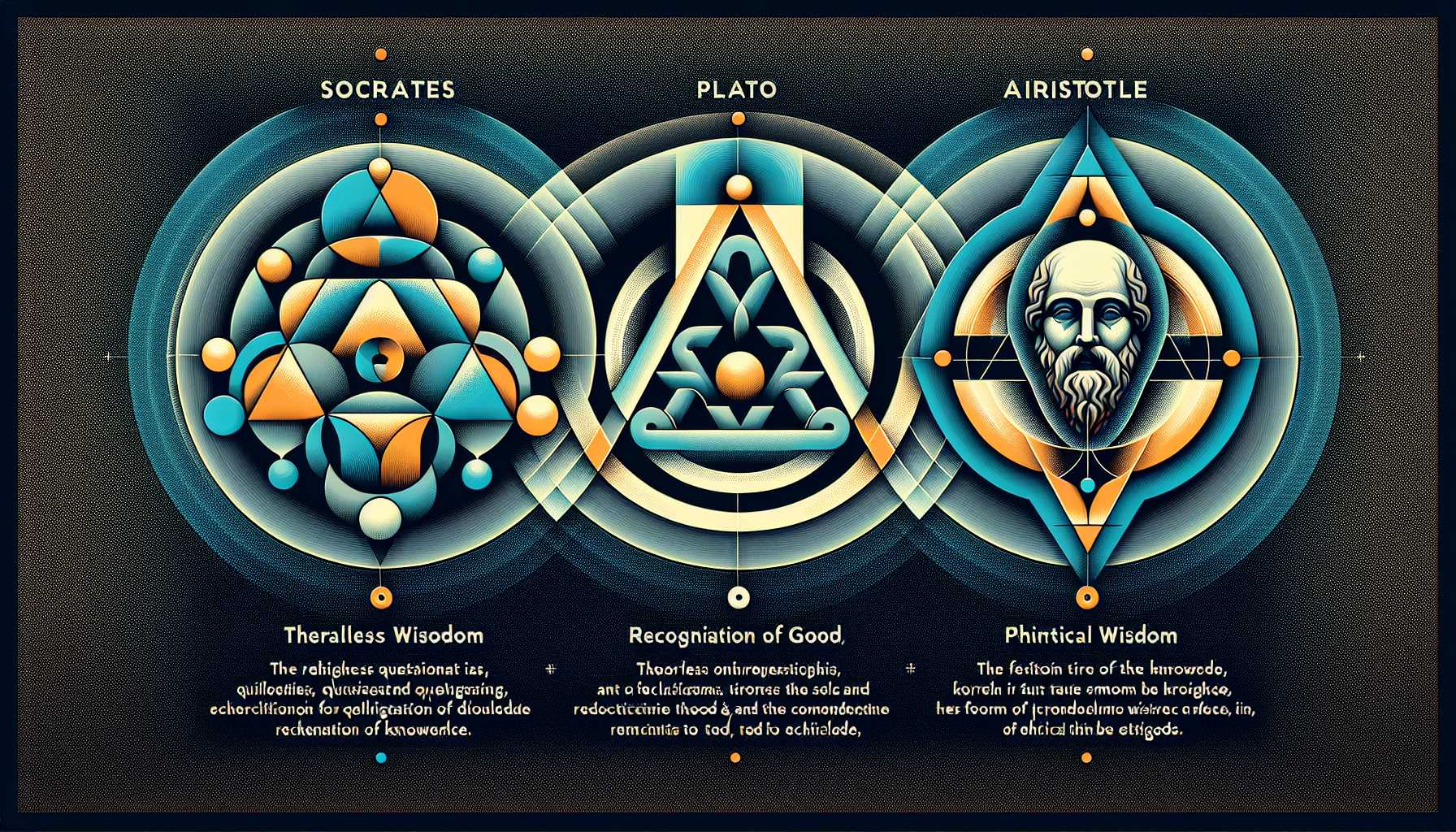
Wisdom Through the Ages Socrates Plato and Aristotles Insights
The article from the Wisdom Center at the University of Chicago discusses the perspectives of three foundational philosophers — Socrates, Plato, and Aristotle — on the concept of wisdom.
Sikago daehakgyo-ui jihae senteoeseo jaksangdoen gisa-neun Sokeurateseu, Peullaton, Ariseutorelreseu-ran se gicho cheolhakjadeul-ui jihae gaenyeom-e daehan gwangjeom-eul nonuimnida.
시카고 대학교의 지혜 센터에서 작성된 기사는 소크라테스, 플라톤, 아리스토텔레스라는 세 기초 철학자들의 지혜 개념에 대한 관점을 논의합니다.
Socrates is characterized by his approach of relentless questioning and dialogue, emphasizing that true wisdom involves recognizing one’s own ignorance.
Sokeurate-seun kkeunimeobneun jilmun-gwa daehwa-ui jeobgeun bangsig-euro teugjingji-eojimyeo jinjeonghan jihae-neun jasin-ui mujireul insikhaneun geos-gwa gwallyeon-i ittago gangjo-hamnida.
소크라테스는 끊임없는 질문과 대화의 접근 방식으로 특징지어지며 진정한 지혜는 자신의 무지를 인식하는 것과 관련이 있다고 강조합니다.
He viewed wisdom as a moral quality, deeply linked to how one lives and interacts with others, famously stating that 'the unexamined life is not worth living.'
Geu-neun jihae-reul dodeogjeok pumjil-lo bogo, tain-gwa eotteoke sal-agago sanghojagyunhanji gipi yeongwan-doe-ido-go bo-ass-eumyeo, yumyeonghage 'geomto-doeji anheun salm-eun sal gachi-ga eobsda'go malhaess-eumnida.
그는 지혜를 도덕적 품질로 보고, 타인과 어떻게 살아가고 상호작용하는지 깊이 연관되어 있다고 보았으며, 유명하게도 '검토되지 않은 삶은 살 가치가 없다'고 말했습니다.
Plato, a student of Socrates, elaborates on the notion of wisdom in his works, especially in 'The Republic,' where he describes the philosopher-king as the ideal ruler.
Sokeurate-seu-ui jejain Peullaton-eun geu-ui jagpum, teukhi 'Gonghwaguk'eseo jihae-ui gaenyeom-eul jasehi seolmyeonghamyeo cheolhakja wang-eul isangjeog-in tongchijaro seolmyeonghamnida.
소크라테스의 제자인 플라톤은 그의 작품, 특히 '공화국'에서 지혜의 개념을 자세히 설명하며 철학자 왕을 이상적인 통치자로 설명합니다.
For Plato, wisdom is an understanding of the Forms, particularly the Form of the Good, and is essential for achieving justice and knowledge.
Peullaton-ege jihae-neun ideaya-e daehan ihae, teukhi seon-ui idea-ro, jeong-ui-wa ji-sik-eul dalseonghaneun de pil-su-jeog-imnida.
플라톤에게 지혜는 이데아에 대한 이해, 특히 선의 이데아로, 정의와 지식을 달성하는 데 필수적입니다.
He believed that wisdom has a rational foundation and is connected to a higher truth that transcends the material world.
Geu-neun jihae-ga hamnijeok todae-e giban-hago muljil segye-reul choeolhaneun deo nop-eun jinli-wa yeongyeoldoeeo ittago mideoss-eumnida.
그는 지혜가 합리적 토대에 기반하고 물질 세계를 초월하는 더 높은 진리와 연결되어 있다고 믿었습니다.
Aristotle, Plato's student, provides a more practical view of wisdom, classifying it into two types: theoretical wisdom (sophia) and practical wisdom (phronesis).
Ariseutorelreseu-neun Peullaton-ui jejalo-seo jihae-e daehan boda silyongjeog-in gwanjeom-eul jegonghamyeo ileul ilonjeog jihae(sophia)wa silcheonjeog jihae(phronesis)-ui du gaji yuhyeong-euro bunryuhamnida.
아리스토텔레스는 플라톤의 제자로서 지혜에 대한 보다 실용적인 관점을 제공하며 이를 이론적 지혜(소피아)와 실천적 지혜(프론레시스)의 두 가지 유형으로 분류합니다.
He emphasizes that wisdom is not just about knowledge, but also about the ability to apply knowledge in practical situations.
Geu-neun jihae-neun dansunhi jisik-e gwanhan geos-i anira jisik-eul silje sanghwang-e jeog-yonghal su issneun neungnyeog-gwado gwallyeon-i ittago gangjo-hamnida.
그는 지혜는 단순히 지식에 관한 것이 아니라 지식을 실제 상황에 적용할 수 있는 능력과도 관련이 있다고 강조합니다.
Aristotle sees wisdom as a virtue, closely tied to ethical behavior, suggesting that a wise person is one who makes sound judgments and decisions that lead to a good life.
Ariseutorelreseu-neun jihae-reul mideog-eulo bomyeo, yullijeog haengdong-gwa miljeobhage yeongyeoldoeeo iss-eo, hyeonmyeonghan saram-eun olbareun pandang-gwa gyeoljeong-euro joeun salm-euro ieojineun saram-ila-go je-anhamnida.
아리스토텔레스는 지혜를 미덕으로 보며, 윤리적 행동과 밀접하게 연결되어 있어, 현명한 사람은 올바른 판단과 결정으로 좋은 삶으로 이어지는 사람이라고 제안합니다.
Consequently, each philosopher offers unique insights into the nature of wisdom, reflecting their larger philosophical schools of thought.
Gyeolguk, gak cheolhakja-neun jihae-ui bonjil-e daehan dogteukan tongchal-eul jegonghamyeo igeos-eun geud-ui deo keun cheolhakjeog sajo-reul banyeonghamnida.
결국, 각 철학자는 지혜의 본질에 대한 독특한 통찰을 제공하며 이것은 그들의 더 큰 철학적 사조를 반영합니다.
Based on this article
